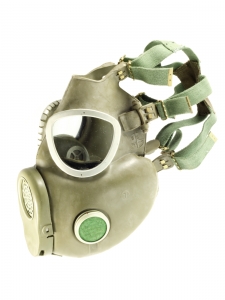

Gas masks, the emblem of the survivalist, are impractical for preppers in North America and offer a false sense of security to those who buy them.
Israel: Where Gas Masks are Policy
If there's any place on Earth that knows about gas masks in survival situations, it's Israel. The Israeli government has on many occasions issued gas masks to citizens over fears of a chemical attack. Here's an excerpt of an Haaretz article from 2010:
Israel has begun distributing new gas masks to its 7 million citizens to offer protection against a possible chemical attack.
Israel's postal service is handing out the equipment in a process, it says, that will take about three years.
Avi Hochman, CEO & President of the Israel Postal Company stated that they have made the necessary preparations for the task, including a state-of-the art technological and logistical infrastructure.
With speculation about a possible war with Iran, Israel continues to distribute gas masks to this day. This excerpt is from an Aug. 17, 2012, Reuters article:
Nonetheless, the spin, leaks and anonymous briefings have spread anxiety, with queues building for gas masks at Israeli distribution centers and hedge funds laying bets on a potential spike in oil prices because of the war threat.
That same anxiety prompted gas mask distribution in 1991 during the first Gulf War.
Preppers in North America may have similar concerns about attacks. Buying a gas mask seems to be a logical reaction. However, there are three reasons this is a waste of money.
1. What Chemical or Biological Attacks are You Anticipating?
How much do you really know about chemical weapons?
Gas masks are not one-size-fits-all. Depending on make and model, some work better against certain agents than others. Even then, consider the ever-changing nature of biological and chemical weapons. Yes, there are certain standbys, such as anthrax. But just as the flu changes from year-to-year, so can the technology behind these weapons. Government officials may know about the latest strains, but how much does the average prepper know about these things?
Since civilian gas mask products aren't as robust as flu vaccines, dollars are better spent elsewhere.
2. Gas Masks Have Expiration Dates
Many surplus military stores offer gas masks. However, buyers and sellers may not know the expiration dates of what's being sold. Just like anything else, the components that protect from chemical agents break down over time. That's why it's important to know when the gas mask expires.
Some models come with replaceable filters. See point 1. When compared with other items in a survival kit, these filters have a relatively short shelf life. Further reading about gas mask filters can be found here. Resources are better put toward other items.
3. The United States is a Big Place
Israel's 7.6 million people live in an area about the size of New Jersey, according to the CIA World Factbook. Nearly all of them, 92%, live in urban areas. A chemical attack has a better chance of affecting more people because of these demographics.
By comparison, 82% of the 315 million citizens of the United States are in cities spread out across a much larger area than Israel. Chances are good that even urban preppers won't live in the city where a chemical attack would happen.
The exceptions are New York City and Washington, D.C., where the threat of a large-scale terrorist attack has already been demonstrated. Because the events of Sept. 11, 2001, remain the only such incidents, it stands to reason preppers not living in those areas are less likely to encounter attacks requiring gas masks.
It's also reasonable to assume many preppers do not live in urban environments. The suburbs, exurbs and rural areas provide the space necessary for readiness. How likely is a chemical or biological attack in those places? Terrorists want to inflict maximum damage. They'll most likely choose urban areas.
Conclusion
If the odds don't provide comfort, preppers should ask this question: “What is the most likely disaster to afflict this area?” Adjust survival plans accordingly.

Next Step: Get your FREE Printable Target Pack
Enhance your shooting precision with our 62 MOA Targets, perfect for rifles and handguns. Crafted in collaboration with Storm Tactical for accuracy and versatility.
Subscribe to the Gun Digest email newsletter and get your downloadable target pack sent straight to your inbox. Stay updated with the latest firearms info in the industry.

![Best Concealed Carry Guns In 2025 [Field Tested] Wilson Combat EDC X9S 1](https://gundigest.com/wp-content/uploads/Wilson-Combat-EDC-X9S-1-324x160.jpg)


![Best 9mm Carbine: Affordable PCCs [Tested] Ruger Carbine Shooting](https://gundigest.com/wp-content/uploads/Ruger-Carbine-Shooting-100x70.jpg)
![Best AR-15: Top Options Available Today [Field Tested] Harrington and Richardson PSA XM177E2 feature](https://gundigest.com/wp-content/uploads/Harrington-and-Richardson-PSA-XM177E2-feature-100x70.jpg)

I’m not worried so much about a terrorist attack as I am a chemical spill or industrial fire. I live in a semi-rural community with several small industrial sites within close proximity to my home. A spill or fire could release noxious vapors or smoke. My family could be just as dead from this type of event as a direct NBC attack by al Qaeda. Prepping and survival isn’t just about terrorists.
Bad Advice.
Three reasons to have a gas mask
– Volcanic ash fallout
– Wild Fire – Limited use, but you survive
– Home fire – Very Limited Use time, but you can recover family and escape.
As a former Chemical Staff Specialist in the military, most of your story is correct. American gas masks are pretty much one size fits all with adjustment straps. But unless you know what gas the enemy will use, it’s kind of hard to make sure you have the right filter. Sarin would probably be what most enemies would use, because it’s cheap and plentiful, but if they happen to have VX, you’re screwed. Gas masks won’t protect much because VX in a vapor will penetrate your skin, unless you are wearing special suits, and you will be dead in 60 seconds. Unlike what they showed in the movie “The Rock.” There is no annecdote for VX. If it hits your skin you are toast!
Thanks for your feedback, Dix. When researching for this article, it became clear to me that there is little the average person could do during a chemical attack. Unless you knew of the attack ahead of time, these agents would likely kill you before you could reach an effective gas mask or suit.
Given your military background in this area, is there anything the average person could do that would be affordable and effective?
In a last ditch effort, a bad gas mask is better than none at all.